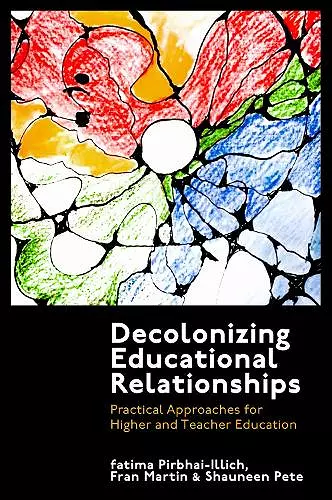Decolonizing Educational Relationships
Practical Approaches for Higher and Teacher Education
Fran Martin author fatima Pirbhai-Illich author Shauneen Pete author
Format:Hardback
Publisher:Emerald Publishing Limited
Published:6th Dec '23
Should be back in stock very soon

Due to the enduring legacy of the colonial, capitalist project, we have arguably entered an era of social, cultural, economic, and environmental collapse. There is a heightened awareness of a range of global issues including racism and xenophobia, economic and cultural protectionism, environmental degradation, and climate change – yet there appears to be a resistance to taking action that challenges the status quo, maintaining a way of life that continues to divide the world in unequal and inequitable ways, including in education.
The complicity of westernized education in contributing to these issues has led calls to decolonize educational ideologies, structures, and practices. In response, the authors present a novel way of thinking and a robust foundation for de/colonizing educational relationships in Higher and Teacher Education, illustrated by examples of applications to practice. A hybrid style of writing weaves their own narratives into the text, drawing on their experiences in a range of educational settings.
This insightful book delves into the critical importance of transforming educational relationships as a means to challenge coloniality within education. Rather than shying away from the intricate complexities and inevitable dissonances that arise in collective change efforts, this book treats them as catalysts for deepened learning and expanded accountability. It refrains from offering simplistic solutions or universal remedies, and instead equips educators with valuable frameworks, tools, and thought-provoking questions to identify and interrupt ongoing colonial dynamics within mainstream educational institutions. By doing so, it offers an important gesture toward how we might learn to live together differently.
-- Sharon Stein, Ph.D, Professor Department of Educational Studies, University of British Columbia, xʷməθkʷəy̓əm (Musqueam) TerritoryRelationships go to the heart of education. As the authors point out, however, our relationships are deeply entangled in coloniality. Drawing on a wealth of evidence and personal lived experience, this book asks the crucial question as to how we as educators can go about de/colonizing our relationships. It is vital reading for all those interested in decolonizing education in the interests of more socially, economically and epistemically just futures.
-- Professor Leon Tikly FAcSS, University of BristolThis book is not only a courageous text, but one of the premium texts that approach decoloniality from a global perspective, considering the perspectives of once-colonized nations. It is critical that when we discuss decoloniality that we do not erase the discourses and materialities of multiple nations in the world when engaging in pluriversal, democratic knowledge construction, and dissemination. This text does that work while engaging in theory, relationalities, spirituality, and expanded possibilities. This is a must-read book for our generation and will be a foundational text for current and future scholars of anti-oppressive and anti-colonial work.
-- Kakali Bhattacharya, Professor, Research Evaluation and Methodologies, School of Human Development and Organizational Studies in Education, University of Florida, USADecolonizing Educational Relationships is essential reading for everyone working in educational environments. The authors use beautifully crafted prose, imagery, and lyricism to illuminate how we are both affected by and complicit in coloniality. fatima, Fran, and Shauneen then model self-reflexive dialogue to help the reader imagine how their own de/colonizing journeys might look. They offer practical activities that move beyond supplementing the writing, which enables readers to engage in de/colonial action while simultaneously doing the cognitive labour to interrogate colonial systems and practices. Although the authors explore the seemingly impenetrable colonial reality within educational systems, their book is characterized by an invitation to hope. They enable the reader to believe in the potential for educational practices that are fundamentally relational, pluriversal, emergent, and just; that is, educational practices that serve everyone well. The book is both a work of art and call to action—every reader will emerge the better for having experienced it.
-- Robin Alison Mueller, Associate Professor, School of Education and Technology, Royal Roads University, CanadaThe decolonization of knowledge is now a key concern for many social scientists across the world. In this book, the authors eloquently spell out what decolonization of knowledge might look like, and how decolonization might take on specific meanings in terms of methodological, disciplinary, and geopolitical context. It is a welcome addition to the rapidly growing scholarship on decolonization.
-- Ali Meghji, Associate Professor in Social Inequalities, Department of Sociology, University of CambridgeThis book is a must read for anyone wanting to better understand and practice de/colonizing education. Through a new focus on relationships, fatima, Fran and Shauneen offer caring, accessible and critically-honed insights into process, grounded in extensive experience and practical exercises. In showing how to decentre from dominant Euro-centric models through their actionable de/colonial imaginary, they offer powerful means to contribute to working for a more socially-just world.
-- Kerry Chappell , MA Oxon, PhD, SFHEA Associate Professor of Education, University of Exeter, MA Creative Arts in Education, Programme Co-ordinator and Dance Lecturer, Leader for Creativity and Emergent Educational-futures NetISBN: 9781800715301
Dimensions: 229mm x 152mm x 17mm
Weight: 536g
280 pages